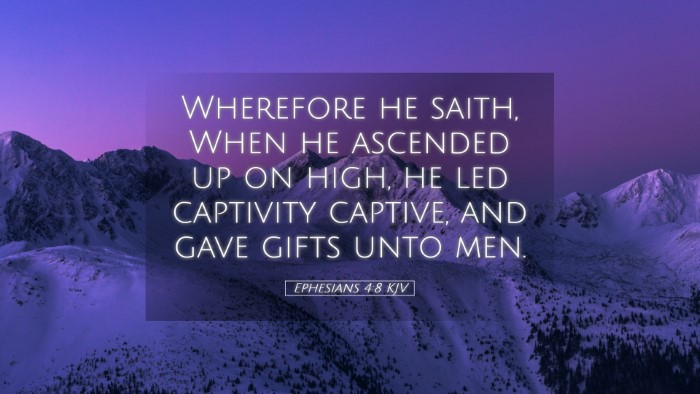Ephesians 4:8 Commentary
Ephesians 4:8: "Wherefore he saith, When he ascended up on high, he led captivity captive, and gave gifts unto men."
Introduction
This verse serves as a pivotal point in the apostle Paul's exhortation to the church at Ephesus regarding unity, gifts, and the ministry of Christ. The quotation from Psalm 68:18 is significant in understanding the theological context of Christ's ascension and His ongoing work in and through His church.
The Quotation from Psalm 68
Paul’s reference to Psalm 68 in Ephesians 4:8 emphasizes the victory of God. This Psalm is often celebrated for its themes of triumph and divine leadership.
- Matthew Henry: Henry notes that this psalm illustrates God's leading the Israelites from Egypt to Canaan, portraying Him as a conquering king who receives gifts from His people.
- Albert Barnes: Barnes expounds that Paul adapts this passage to affirm that Christ, through His resurrection and ascension, has triumphed over His enemies, thus leading captivity captive.
- Adam Clarke: Clarke interprets the idea of "leading captivity captive" as Christ conquering sin, death, and hell, thereby liberating those held in bondage.
Interpretation of "Ascended Up on High"
The phrase "ascended up on high" signifies the exaltation of Christ. This is central to His redemptive work, implying both a physical ascension and a spiritual exaltation.
- Matthew Henry: Henry observes that this ascent is not only a return to His rightful place but also the commencement of His further work to edify the church.
- Albert Barnes: Barnes emphasizes the significance of the ascension as an event that confirms Christ's authority and His ability to bestow grace and gifts upon believers.
- Adam Clarke: Clarke highlights that this ascension demonstrates Christ's preeminence over all, further pressing the idea of His ongoing intercession for His people.
“Led Captivity Captive” Explained
The phrase "led captivity captive" suggests a paradox where captivity is transformed into freedom. This profound statement is pivotal to understanding Christ’s victory over spiritual forces.
- Matthew Henry: He elaborates that those who were once captives to sin are now freed and transformed by the redemptive work of Christ.
- Albert Barnes: Barnes indicates that this notion implies a reversal of fortunes for those held captive, who, through Christ, are now liberated and enriched.
- Adam Clarke: Clarke reflects on this concept as not only liberating believers but also equipping them for ministry through the gifts bestowed by Christ.
“Gave Gifts Unto Men” - Theological Implications
Paul concludes this verse with the assertion that Christ bestows gifts upon His church. This provision is pivotal for the function and health of the body of Christ.
- Matthew Henry: Henry articulates that these gifts are diverse and are given for the purpose of unity and maturity within the body of believers.
- Albert Barnes: Barnes comments on the nature of these gifts, interpreting them as both spiritual abilities and offices designed for the edification of the church.
- Adam Clarke: Clarke stresses that these gifts serve to promote the common good and facilitate the work of God in the world.
Application for the Church Today
Ephesians 4:8 invites contemporary believers to consider the implications of Christ's ascension and the gifts He has bestowed. Understanding and utilizing these gifts is crucial for spiritual growth and communal harmony.
- Pastoral Insight: Leaders are encouraged to help congregants discern their gifts and callings, fostering a culture of service and active participation in the church.
- Theological Reflection: Theologically, this passage invites further contemplation on the nature of Christ's ongoing reign, His sovereignty, and the implications for eschatology.
- Practical Ministry: In practical terms, the church is called to equip the saints for ministry, recognizing the diversity of gifts as essential for fulfilling the Great Commission.
Conclusion
Ephesians 4:8 encapsulates the profound truths of Christ’s victory, ascension, and the subsequent gifting to believers. It serves as a reminder of our identity and purpose in light of the ascended Christ. The collaborative effort of the church in exercising these gifts is paramount for accomplishing God's mission in the world.


